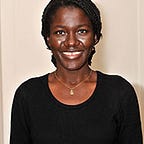Why I Refuse to Get An English Name
Growing up, the dissonance between the ease others had when learning my parent’s English names and the difficulty in attempting to pronounce my name did not escape me. I dreaded roll call in grade school. The uncomfortable prolonged pause and accompanying perplexed look of the instructor rattling off names indicated me just as soundly as the jumbled pronunciation that ensued. After many back-and-forth banters in correcting how to say my name, I quickly realized as a young child that there was no instruction I could give to yield the way my parents said my name. The intonations inherent to the traditional pronunciation of my name was just not in the English language, and so I significantly lowered my expectations. So much so that I gave up on putting forth my first name and grew up being called by my last name from elementary school through high school. Modifying the first letter to be silent was passable. But when my younger brother, whose first name and last name are the same was about to start high school as I was about to enter my senior year of college, I could not make that exchange anymore.
One of my best friends at the time was a girl named Beka. Beka was her English name, given to her by her Korean parents who hoped that she would have an easier assimilation into American life. Beka seemed to also be the English name with the closest similarity to my birth first name. And so I modified my first name to be akin to the pronunciation of Beka, but with the first letter changed. I still use Beka as the comparison when describing how to pronounce my name now. But as much as I have consistently been complicit in modifying the pronunciation of my name — whether moreso for the ease of others or for my ease in not having to make the effort to correct and re-correct — I have never once considered adopting an English name.
I have never explicitly asked my parents why they did not give me an English name. Perhaps my lack of doing so rests in a sense that I already know why. Names are important. They convey meaning — carrying the histories of lives already lived and hopes for life yet to be lived. Even before I knew what my name meant, as a young child I knew that my parents giving me a name of origin different from theirs was intentional. When I learned the history of how I was named and the meaning of my first name — “respectable one” — I felt even more resolved to keep it. As the number of years I live in this country increases and I find myself I identifying more and more with being an American, further resolution to keep my name also comes from a desire to hold onto any ties that I have to my birth country. It is the strongest identifier I have that I derive from a certain tribe, lineage and culture. As long as I live in this country, likely for the rest of my life, I think it’s crucial that I am persistently reminded of from whom and where I am from.
This phenomenon of my parent’s generation having English names is not unique to my Cameroonian family. One of my college friends and I discussed at length this shared experience. Her parents had given her a traditional Nigerian name while they themselves had English names. We discussed how these English names were moreso “Christian” names that our parents were given. Both of our parents grew up in regions with a strong presence of Christian missionaries where religious assimilation was expected.
Choosing a new name or modifications of one’s name is not uncommon among people from a variety of immigrant backgrounds. It is seemingly a natural process in the act of assimilation. Assimilation is often the process by which a minority group adopts and incorporates the customs of the majority group. One thus comes to resemble — partially or fully — the society-at-large. However, I question how much we should assimilate to new cultures and environments rather than pushing these same environments to also adapt and change.
Having a “different” name has sparked sometimes uncomfortable but also poignant conversations. It confronts identity head-on. These conversations readily expose biases and ignorance. Yet such conversations have also given opportunity for humility and growth. And thus I have realized that what may feel like a residual signifier of foreignness can be wielded into a double edged sword of advocacy. It challenges status quos of representation, pushing us to weave a more inclusive American fabric.
